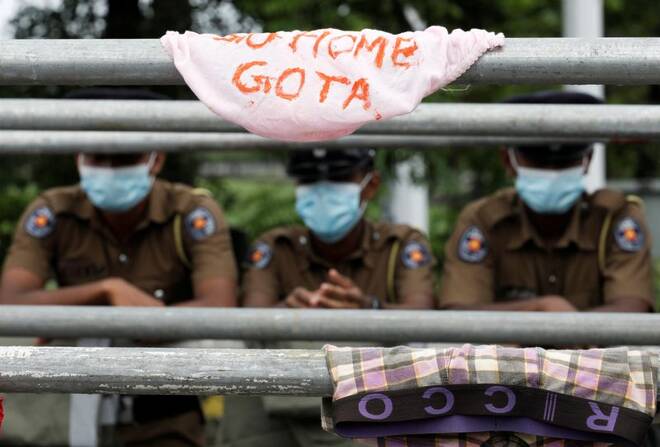Advertisement
Advertisement
Sri Lanka president declares state of emergency after day of protests
By:
By Uditha Jayasinghe and Alasdair Pal COLOMBO (Reuters) - Thousands of shops, schools and businesses closed on Friday as public and private sector workers in Sri Lanka went on strike, demanding the president and the government step down for their mishandling of the island's worst financial crisis in decades.
By Uditha Jayasinghe and Alasdair Pal
COLOMBO (Reuters) -Sri Lankan President Gotabaya Rajapaksa declared a state of emergency on Friday following a day of anti-government strikes and protests over a worsening economic crisis.
The measure, which drew immediate criticism from opposition leader Sajith Premadasa and from Canada’s ambassador, is effective immediately and was taken in the interests of public security, a government notice said.
Police earlier fired tear gas at dozens of demonstrators outside parliament, in the latest in more than a month of sporadically violent anti-government protests amid shortages of imported food, fuel and medicines.
Hit hard by the pandemic, rising oil prices and government tax cuts, Sri Lanka has been left with as little as $50 million in useable foreign reserves, the finance minister said this week.
Details of the latest emergency regulations were not yet made public, but previous emergency laws have given greater powers to the president to deploy the military, detain people without charge and break up protests.
His order must be approved by parliament within 30 days.
Calling on Rajapaksa to resign, Premadasa said the state of emergency “runs counter to seeking any solution to the crisis”.
Canada’s ambassador to Sri Lanka, David McKinnon, said the decision was unnecessary.
“Over the past weeks, the demonstrations across Sri Lanka have overwhelmingly involved citizens enjoying their right to peaceful freedom of expression, and are a credit to the country’s democracy,” he said.
‘SICK AND TIRED OF POLITICIANS’
Hundreds of university students and other protesters gathered on Friday on the main road to parliament where they had started a sit-in on Thursday.
Some hung underwear on barricades as an insult to the political leadership.
“We are here because we are sick and tired of politicians lying to us. We want the president and this government to go home,” said Purnima Muhandiram, a 42-year-old advertising professional.
Thousands of shops, schools and businesses closed earlier on Friday as public and private sector workers went on strike, demanding the president and the government step down for their handling of the island’s worst financial crisis in decades.
Commuters were left stranded as private bus and train operators joined the strike.
Healthcare workers also joined the strike, though emergency services remained operational.
Rajapaksa has refused to step down, repeatedly calling for a unity government led by him, but opposition leaders plan to move a no-confidence motion against the president and the government next week.
Rajapaksa previously declared a state of emergency on 1 April but rolled it back after five days.
(Reporting by Uditha Jayasinghe and Alasdair Pal; Editing by Simon Cameron-Moore, Frances Kerry and John Stonestreet)
About the Author
Reuterscontributor
Reuters, the news and media division of Thomson Reuters, is the world’s largest international multimedia news provider reaching more than one billion people every day. Reuters provides trusted business, financial, national, and international news to professionals via Thomson Reuters desktops, the world's media organizations, and directly to consumers at Reuters.com and via Reuters TV. Learn more about Thomson Reuters products:
Did you find this article useful?
Latest news and analysis
Advertisement
